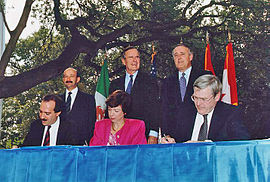 Democracy is kept at bay and is no longer a consideration for the governing class. Ford Motor Company, also known simply as Ford, was founded in Michigan by Henry Ford. Today, the executives at Ford do not see the company strictly as an American company. They see it as a global entity. Their managers are taught to think global. At the same time, Detroit is falling apart. This is part of The Global Class War
Democracy is kept at bay and is no longer a consideration for the governing class. Ford Motor Company, also known simply as Ford, was founded in Michigan by Henry Ford. Today, the executives at Ford do not see the company strictly as an American company. They see it as a global entity. Their managers are taught to think global. At the same time, Detroit is falling apart. This is part of The Global Class War that the writer Jeff Faux speaks of.
Jeff Faux’s story about ‘The Global Class War’ is the story of post-war America. It’s about globalization and the beneficiaries, the corporate executives, mostly at the expense of the working people. Never before have so few dominated the lives of so many. The results are a declining nation, a once prosperous nation that’s no longer a sovereign nation, and many would call it an oligarchy. Some would label it a fascist country.
In the 1990′s the Democrats controlled Congress. Bill Clinton became president and cheerleader for NAFTA. Robert Rubin (another Goldman Sachs boy), the secretary of treasury, was the star of the show.
Rubin’s pals Alan Greenspan and Larry Summers were proponents of NAFTA. All were behind the financial deregulation that was promulgated for the banksters to eliminate the Glass-Steagall Act. Socialism for the rich was now set in place. Fast forward into the 21st century and we’ve seen the disastrous results from these policies.
As the writer points out to the reader, NAFTA failed to deliver on its promises to the workers of America and Canada. The Mexican farmers fared even worse, displacing roughly 2 million of them. Is this what we would call a shining success?
Other writers feel the same way about NAFTA: 20 Years Of Spin For America’s Failed Trade Model; Nafta Has Helped Put The United States In The Poorhouse. There’s been plenty of spin. That’s for sure.
Has NAFTA helped workers in Mexico? It has led to poverty and a huge amount of violence. In many ways it made conditions worse for Mexicans. Why are Mexicans flooding into America if the plan was a success? The elites have no answer for this. They’re just trying to prevent a catastrophe from happening.
Faux spends two chapters on NAFTA explaining what it was really about. What most of us didn’t really understand was that NAFTA, along with globalization, shifted into the interests of the banking class. It was the banksters that profited tremendously, at the expense of the Mexicans and the Americans. NAFTA opened the door for more American imperialism.
More importantly, the social contract between the capitalists and the workers has been ripped to pieces. American wages are intentionally kept low, while its workers compete against the cheapest laborers in the world. The outcome is evident.
The author concludes that there is no such thing as free trade. The United States has been a protectionist nation for most of its duration. And never mind that the majority of people in all three countries opposed NAFTA.
In the world according to Davos, the global constitution is not official, however, there are networks that promote the conception. The central bankers work far beyond the capacity of any legislation and are not beholden to any dinosaur laws. The Kantian catch-22 is solved by a very sophisticated network of global organizations.
Therefore, the global banksters are not constrained by normal sovereign laws.
Yet, with all of the grand talk about the expansion of the global economy, there are signs of collapse and the dollar is starting to weaken. Saddam Hussein was hunted down because he had proposed to trade oil in the Euro, and the Euro is now being traded in Saudi Arabia.
The author mentions another problem that the transnationals have not addressed. The trade deficit can no longer be dismissed, while Japan and especially China have become skeptical of an ailing American economy.
The author makes clear that while Clinton and Rubin supposedly had budget surpluses, the country was running trade deficits even at that time. And the trade deficits have reached unsustainable levels at this point. The American economy has to collapse at some point in time.
In a matter of two decades, the United States went from being a country that loaned credit out to a country that’s deeply in debt. It seems that now it’s payback time.
The connection between the Drug War in Mexico and neoliberal policies is interlocked. Faux has echoed this repeatedly. After NAFTA, the drug flow into the United States increased, and the gun trade flowing from the United States into Mexico increased as well.
The author suggests that the drug trade was enhanced by NAFTA. This topic alone makes the book an interesting read. Faux sheds light on some valuable Mexican history, and links the correlation with American policy.
In the last two chapters it seems like Faux suddenly has become an advocate for an integration of the three countries. He does quite a bit of babbling and I think most Americans would strongly disagree with him.
If you take the last two chapters with a grain of salt, “The Global Class War” makes for a very compelling read. At least Faux makes us aware of the NAFTA mentality and the ideology that has driven it.
Meanwhile, we watch the American economy go down the toilet.
Faux directs us to another author. Who is the governing class? Who Rules America?
[Image Credit: Wikipedia, Public domain.]

